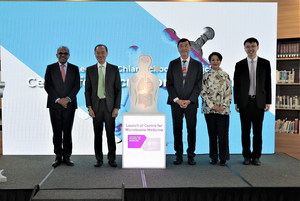Image: (LR) NTU President Professor Subra Suresh Former Singapore Foreign Minister Mr George Yeo Dean of NTU LKCMedicine Professor Joseph Sung Supporter and Donor of the Center for Microbiome Medicine Ms Petrina Leong and Program Director of the Center for Microbiome Medicine Associate Professor Sunny Wong at the opening of the center.
outlook more
Photo credit: NTU Singapore
Nanyang Technological University, Singapore (NTU Singapore) today started the Center for Microbiome Medicine – a research facility that aims to improve human health and find new ways to treat diseases by utilizing the microbiome, which are naturally occurring microorganisms that play an important role in our well-being.
The Research Center of NTU Singapore Lee Kong Chian School of Medicine (LKCMedicine) will work with partners such as the National Healthcare Group, Imperial College London and Singapore-based precision gut microbiome company AMILI to unravel the mechanisms behind microbiome and disease.
Thousands of different types of microbes, including bacteria and fungi, live in and on the human body. In healthy people, the microbes exist peacefully. However, in unhealthy individuals, the imbalance of microbes makes the body more susceptible to disorders such as obesity, metabolic diseases, cancer, lung and skin diseases.
The new research center is headed by program director, Associate Professor Sunny Wong from LKCMedicine, and the facility will focus its research in the areas of nutrition and metabolism, respiratory and environmental, cancer, and infection and other neurological and skin diseases.
Using human sample collections, advanced DNA sequencing and laboratory experiments, researchers will study how the microbiome causes a range of diseases including obesity, diabetes, fatty liver and chronic lung diseases such as bronchiectasis.
With a deeper understanding of how the microbiome is related to these diseases, the researchers hope to translate their discoveries into improved diagnostics and new treatments for patients.
The research center was opened today by his guest of honor Former Secretary of State Mr George Yeoand NTU President Professor Subra Suresh.
NTU President Professor Subra Suresh, said, “The Center for Microbiome Medicine promises to offer innovative ways to monitor and modulate the microbiome to improve human health. Research from this center may also lead to potential new ways to promote healthy living and aging. That goes well with that NTU 2025 Strategic Plan that aims to address Singapore’s national priorities and some of humanity’s grand challenges through strong interdisciplinary collaborations.”
In addition to working closely with local healthcare institutions and international partners, the center will also encourage collaborations between scientists from many disciplines at NTU, including those of Singapore Center for Environmental Life Sciences Engineering (SCELSE), College of Science (COS) and College of Engineering (COE), to develop innovative solutions for microbiome-related diseases.
S$2.5 million gift to advance microbiome studies
To support microbiome research, the new center also received a S$2.5 million gift by Ms. Petrina Leong, Ms. Sandy Leong and Mr. Jimmy Leong on the Madam Wang Lee Wah Memorial Fund.
The Leongs are children of the late Madam Wang Lee Wah, who passed away in 2020 after a long illness.
Donor Mr. Jimmy LeongShe said: “We would like to mark the second anniversary of our mother’s death with a meaningful gesture. We believe that microbiome research is an area that has the potential to bring about far-reaching and positive improvements in public health and we are excited to be part of this momentous journey with LKCMedicine.”
focus on obesity
8.9 percent of Singapore’s adult population is obese.[1] The obesity rate in the country is also at its highest level since 2010. [2]
With obesity on the rise in Singapore and globally, and associated increased health risks such as diabetes, fatty liver, cardiovascular disease and even some cancers, tackling obesity through the microbiome could be a new way forward.
While the disease is commonly associated with unhealthy diet and low physical activity, the gut microbiome is an important interface. Studies have shown that microbes in the gut can affect our eating habits and our ability to lose or gain weight.
One focus of the center is investigating how “good” and “bad” germs in the microbiome can be used to combat the increase in obesity and the diseases associated with it. By identifying beneficial microbes and their impact on obesity, the center’s researchers aim to alleviate obesity and the diseases associated with it. The discovery of new treatments, diagnostic tools and prevention strategies is imminent.
Studies have also shown that obesity is linked to cancer.[3] The center is currently working to understand the role of microbes in obesity-related cancers, such as colon and other cancers of the digestive tract.
Associate Prof. Wong said: “Studies have found that gut microbes can affect metabolic health and cause obesity. Because the microbiome can be easily altered through diet, exercise, and medication, it represents an untapped opportunity for therapeutic manipulation to treat diseases such as obesity and more. Our research center aims to study the mechanisms by which such microbes work to address some of Asia’s pressing public health challenges.”
Professor Joseph Sung, Dean of NTU LKCMedicine and NTU Senior Vice President (Health & Life Sciences). said: “NTU’s initiative to advance research into the microbiome is important as microbes play a critical role in our health, affecting a range of conditions from obesity to chronic obstructive pulmonary disease and fatty liver disease. I believe that microbiome medicine will dramatically change our future therapy of metabolic diseases and obesity, lung diseases and even cancer therapy.”
***END***
[1] Obesity affects 8.9% of the adult population.
[2] Obesity Rate Rises to Highest Level Since 2010; MOH urges the public to exercise and eat healthier
[3] Being overweight or obese increases the risk of cancer.
Disclaimer: AAAS and EurekAlert! are not responsible for the accuracy of the press releases published on EurekAlert! by contributing institutions or for the use of information about the EurekAlert system.
#NTU #Singapore #opens #microbiome #research #center #find #ways #treat #obesity #chronic #diseases


Leave a Comment